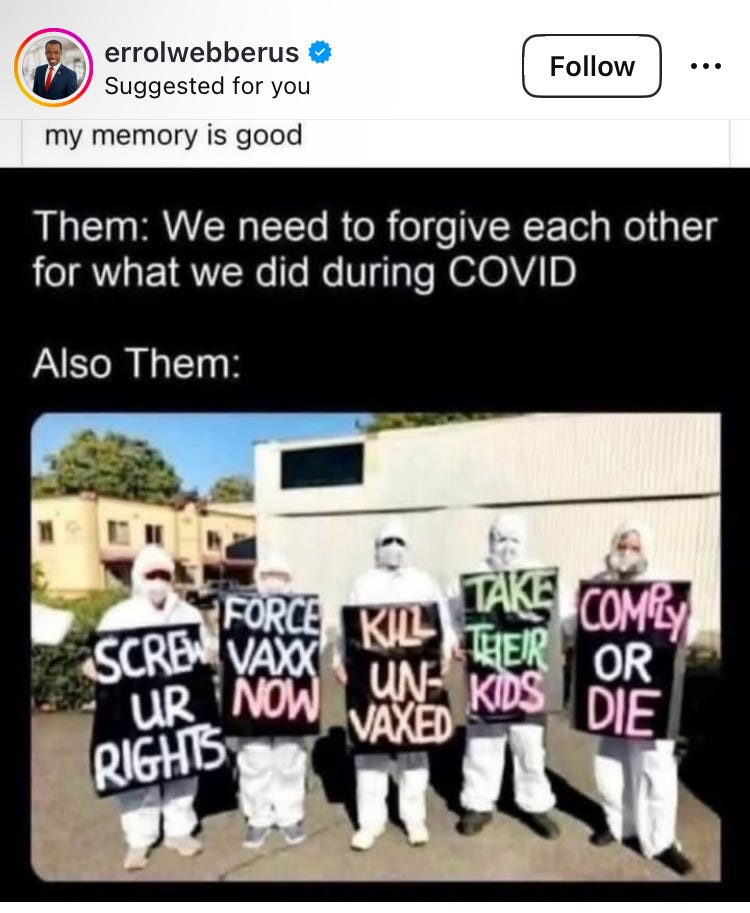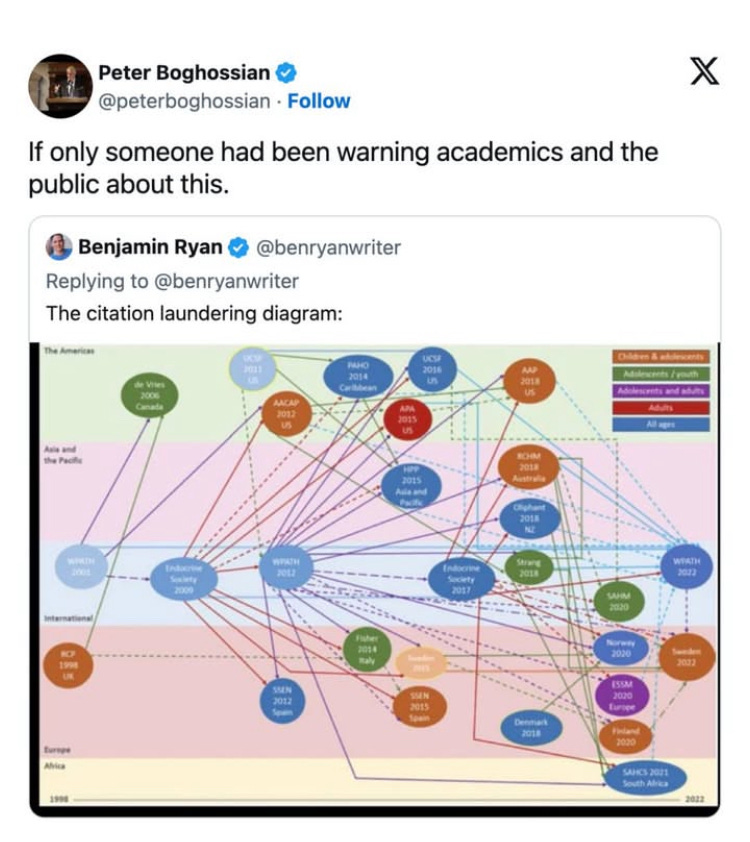We don’t trust the experts because they have proved themselves untrustworthy. Until that fundamental reality is grappled with, the increasingly impotent deflections of ‘rightwing media’ and ‘misinformation’ will continue to grow more and more discrediting for those who try to employ them. It’s not that you experts disagreed with people-it’s that you tried to ruin them, out of spite and cowardice. It’s not that your conclusions were erroneous-it’s that you lied, or pretended to know more than you did, in order to preserve your careers or policy heft or institutional credibility.
I already wrote about the perceptible process of individuals and organizations gingerly trying to extricate themselves from their earlier (public) positions, and assiduously trying to hide the records of their error and viciousness and cowardice, but sometimes specificity helps. You can claim that DEI hurts institutional effectiveness in general all you want-it helps if your case if you can point to Boeing or the RAF or the LAFD. Those data are the things that often end up putting chinks in the psychological armor of ideology, and a chink in the armor is all you need to get the process going.
Soon I will write another essay like this one focusing on the greatest scandal of medical ethics this century, perhaps forever. That is the youth gender modification issue-the perversion of scientific reality-discerning mechanisms to introduce and fortify the claims of activists, to the risks and harms of possibly tens of thousands of young people.
We don’t trust the experts because they have proved themselves untrustworthy-not through their opinions or their science, but through their treatment of dissenters, their unwillingness to admit error (or even the possibility of error) and their almost unanimous cowardice when it comes time to express honest and unpopular opinions.
This is partly an issue about research funding and institutional safeguards and peer review, of course, but it’s also a moral issue, and it is the moral dimension that our institutions seem least inclined to want to grapple with. That’s probably partly due to the fact that we have effectively removed morality and virtue from public discussions (or, rather, we’ve replaced the old virtues with shiny new ones) but it’s also due to the fact that the virtues which were most offended by the mistakes of this period were honesty and courage. Everyone might enjoy being perceived as a victim… but no one wants to be perceived as a coward. Yet most people are cowards, and I think that the tendency is particularly acute among the ranks of experts and professionals.
The media is falling all over itself to reappraise the narratives from 4-5 years ago, but they won’t cover the one thing we’re most curious about (and they’re best placed to answer): the dynamics of their campaign to lie and discredit truthtellers. They refuse to address their own (collective and individual) cowardice.
Right after the New Year, I wrote:
Cultural change continues to accelerate, getting worryingly close to spinning out of control (although what would that even look like?). A huge number of the smartest and most engaged people I know are now effectively on an entirely different end of the political spectrum than they were 5 years ago. In 2023 I wrote:
If your worldview hasn’t significantly shifted in the past 5 years you probably need to update your knowledge and affiliations
Whether or not they recognize it most people and institutions seem to have taken this to heart. On issue after issue the discourse and media narrative and agency positions have shifted, subtly or dramatically. Even the Overton window has shifted, as the formerly dominant cultural institutions have ceded control to competitors. Just imagine what the coverage of the Daniel Penny verdict (and the trial itself!) would have been like in 2020 if you need an illustration of this.
Yet… almost no one has admitted error. People ignore their earlier positions-and persist in proclaiming things, with absolute certainty, that half a decade ago they would have labelled as bigoted or idiotic. Listening to experts and commentators and politicians you hear the same self-assured confidence that their assumptions and their institutions and their ideology (although the ideology is never mentioned) are valid and useful guides to reality and should be trusted. When the conclusions and the recommendations have deviated so sharply from what they were 4-5 years ago this strains credulity. After all, in 2020 those same people were using that same tone. Yet both positions cannot easily be reconciled. What happened?
The truth is that I could’ve written this essay, about COVID retractions-at any point in the past few months. The reversals are coming thick and fast now. I’d probably be able to write one every week for the next two years, the way things are trending. There are many organizations and people eager to amend their standing positions and paper over the most recent extant tweets and interviews and academic papers and articles, so we’re seeing ‘discoveries’ on a regular basis now: the lab leak hypothesis, vaccine efficacy, COVID vaccine risks, vaccine injuries, the harms of masking and lockdowns. In literally every major area of COVID policy the claims that 4 years ago were incredibly risky to make publicly are now the accepted truth, or moving in that direction.
Most astonishingly, millions of people who would’ve (or did) react(ed) with anger and viciousness are now cheerfully repeating the new orthodoxies, without any apology or introspection or apparent cognitive dissonance. They simply pretend that they believed things that they didn’t, and they pretend that they would never do things that they enthusiastically would’ve done. In other words, they’re pretending to be smarter and kinder and fairer than they are. They’re behaving as people are wont to do, I guess. It’s that phenomenon that originally prompted me to write ‘Quietly Correcting’.
The development that prompted me to write this was the New York Times’s op-ed admission yesterday of the validity of the lab-leak theory and (more importantly) the lies and conspiracies of experts: “We Were Badly Misled About the Event That Changed Our Lives“.
The lab leak theory was one of the first COVID ‘misinformation’ dominoes to fall in the public square-natural immunity and vaccine ineffectiveness against contagion came before-decimating the reputations of probably hundreds of organizations.
This is from the article:
We have since learned, however, that to promote the appearance of consensus, some officials and scientists hid or understated crucial facts, misled at least one reporter, orchestrated campaigns of supposedly independent voices and even compared notes about how to hide their communications in order to keep the public from hearing the whole story.
[There] was a March 2020 paper in the journal Nature Medicine, which was written by five prominent scientists, and which declared that no “laboratory-based scenario” for the pandemic virus was plausible. But we later learned through congressional subpoenas of their Slack conversations that while the scientists publicly said the scenario was implausible, privately, many of its authors considered the scenario to be not just plausible but likely. One of the authors of that paper, the evolutionary biologist Kristian Andersen, wrote in the Slack messages, “The lab escape version of this is so friggin’ likely to have happened because they were already doing this type of work and the molecular data is fully consistent with that scenario.”
The article discusses how Jeremy Farrar (chief scientists at the WHO) acquired a burner phone and conspired to lie and produce intentionally, strategically fraudulent data with Francis Collins and Anthony Fauci.
Operating behind the scenes, Farrar reviewed their draft and suggested to the authors that they rule out the lab leak even more directly. They complied. Andersen later testified to Congress that he had simply become convinced that a lab leak, while theoretically possible, was not plausible. Later chat logs obtained by Congress show the paper’s lead authors discussing how to mislead Donald G. McNeil Jr., who was reporting on the pandemic’s origin for The Times, so as to throw him off track about the plausibility of a lab leak.
The article takes a kind of surprised tone (obligatory for this kind of ‘we were fooled!’ media reversal piece) and throws some malefactors on the altar of justice, while sparing institutions and ideologies. It’s very predictable in tone and content, in other words. It ends by recommending some reforms to ‘gain of function’ research that might lessen the risk. I encourage you to read
’s piece on this to see what he thinks about that:Yet in 2020, when people started speculating that a laboratory accident might have been the spark that started the Covid-19 pandemic, they were treated like kooks and cranks. Many public health officials and prominent scientists dismissed the idea as a conspiracy theory, insisting that the virus had emerged from animals in a seafood market in Wuhan, China. And when a nonprofit called EcoHealth Alliance lost a grant because it was planning to conduct risky research into bat viruses with the Wuhan Institute of Virology — research that, if conducted with lax safety standards, could have resulted in a dangerous pathogen leaking out into the world — no fewer than 77 Nobel laureates and 31 scientific societies lined up to defend the organization.
So, the Wuhan research was totally safe and the pandemic was definitely caused by natural transmission: It certainly seemed like consensus.
No, it didn’t seem like a consensus. There were already murmurs of dissent, even in 2020-2021. It was the New York Times and CNN and government censors who worked overtime to make it appear to be a consensus.
I’m not even a scientist and I encountered some of those murmurs, early on. Might it say something about the health of our system that laymen are getting access to (public, but intentionally marginalized) information? Isn’t it probably a bad thing that important facts are being artificially being kept out of professional and scientific information ecosystems? Don’t you think that this kind of nervous institutional conformity might be a huge flaw, which deserves its own acknowledgments and reforms?
I only write a post when I have something to say and what I have to say is this: The New York Times and the Dr. Leana Wan and the medical ‘experts’ at CNN and the censors at the DHS are all scrambling to readjust their reality and-where necessary-their image. But all of this movement will continue to seem fake and self-serving (which it certainly is). It will continue to seem prompted more by the same cowardice that compelled them to join the mob in the first place than any spirit of reform. It’s not your opinions that have caused us to distrust you-it’s the way you treated people with different opinions. Changing your public stance cannot ameliorate that flaw. Indeed, we will continue to distrust you because we’ll know that you’re susceptible to cruelty and groupthink, because you are. We’ll suspect that you would be likely to betray your training and your personal loyalties again, if the risks seem great enough, because that’s still the kind of organization/person you are.
Specifically to the New York Times: we don’t want to read about scientists’ conspiracies and lies.
broke that story like a year ago. We want to read about your dishonesty, your internal and externalized mob hysteria, your capture by ideologues and petty careerists. We want to read about your institutional cowardice. I think you owe us that much.













I retired early after 30 years employment when the CEO sent around an all staff email in late 2021 saying he was going to mandate the Vax for all staff. Unlike me, most people went along and got jabbed like sheep.
I had lunch with one of my ex-colleagues recently, and in a hushed whisper with a wide-eyed expression she told me that she thought the vaccines had hurt some people, and were causing others to catch cancer and other diseases. This, from someone who had been an enthusiastic pusher of the vaccine and booster scam.
Having had my mother recently die from a bizarre turbo-cancer, and my niece crippled by heart disease post vax, and several other ex-colleagues drop dead out of the blue, all I could think was "Well no shit, Sherlock".
There must be hundreds of millions of people like her experiencing profound cognitive dissonance over this massive turnaround in the narrative.